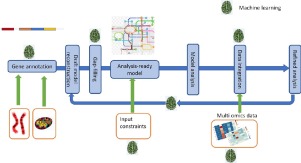当前位置:
X-MOL 学术
›
Curr. Opin. Biotech.
›
论文详情
Our official English website, www.x-mol.net, welcomes your
feedback! (Note: you will need to create a separate account there.)
Recent advances on constraint-based models by integrating machine learning.
Current Opinion in Biotechnology ( IF 7.1 ) Pub Date : 2019-12-05 , DOI: 10.1016/j.copbio.2019.11.007 Pratip Rana 1 , Carter Berry 2 , Preetam Ghosh 1 , Stephen S Fong 2
Current Opinion in Biotechnology ( IF 7.1 ) Pub Date : 2019-12-05 , DOI: 10.1016/j.copbio.2019.11.007 Pratip Rana 1 , Carter Berry 2 , Preetam Ghosh 1 , Stephen S Fong 2
Affiliation

|
Research that meaningfully integrates constraint-based modeling with machine learning is at its infancy but holds much promise. Here, we consider where machine learning has been implemented within the constraint-based modeling reconstruction framework and highlight the need to develop approaches that can identify meaningful features from large-scale data and connect them to biological mechanisms to establish causality to connect genotype to phenotype. We motivate the construction of iterative integrative schemes where machine learning can fine-tune the input constraints in a constraint-based model or contrarily, constraint-based model simulation results are analyzed by machine learning and reconciled with experimental data. This can iteratively refine a constraint-based model until there is consistency between experimental data, machine learning results, and constraint-based model simulations.
中文翻译:

通过集成机器学习在基于约束的模型上的最新进展。
将基于约束的建模与机器学习进行有意义的集成的研究尚处于起步阶段,但抱有很大希望。在这里,我们考虑了在基于约束的建模重构框架中实现机器学习的地方,并强调了开发能够从大规模数据中识别有意义的特征并将其与生物学机制建立联系以建立因果关系以将基因型与表型联系起来的方法的需求。我们鼓励构建迭代集成方案,其中机器学习可以在基于约束的模型中微调输入约束,或者相反,通过机器学习对基于约束的模型仿真结果进行分析,并与实验数据进行协调。这样可以迭代地优化基于约束的模型,直到实验数据之间保持一致为止,
更新日期:2019-12-06
中文翻译:

通过集成机器学习在基于约束的模型上的最新进展。
将基于约束的建模与机器学习进行有意义的集成的研究尚处于起步阶段,但抱有很大希望。在这里,我们考虑了在基于约束的建模重构框架中实现机器学习的地方,并强调了开发能够从大规模数据中识别有意义的特征并将其与生物学机制建立联系以建立因果关系以将基因型与表型联系起来的方法的需求。我们鼓励构建迭代集成方案,其中机器学习可以在基于约束的模型中微调输入约束,或者相反,通过机器学习对基于约束的模型仿真结果进行分析,并与实验数据进行协调。这样可以迭代地优化基于约束的模型,直到实验数据之间保持一致为止,











































 京公网安备 11010802027423号
京公网安备 11010802027423号